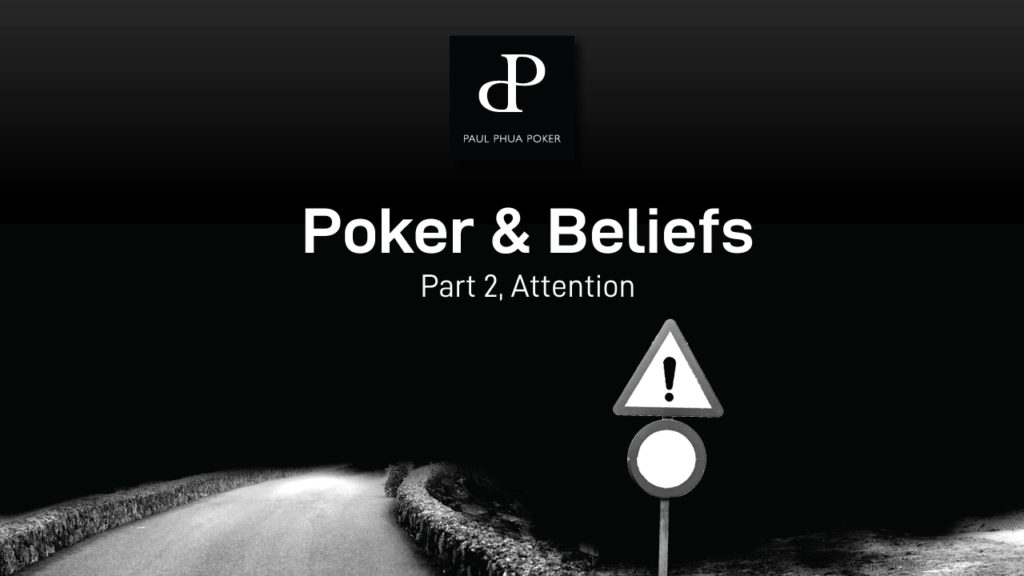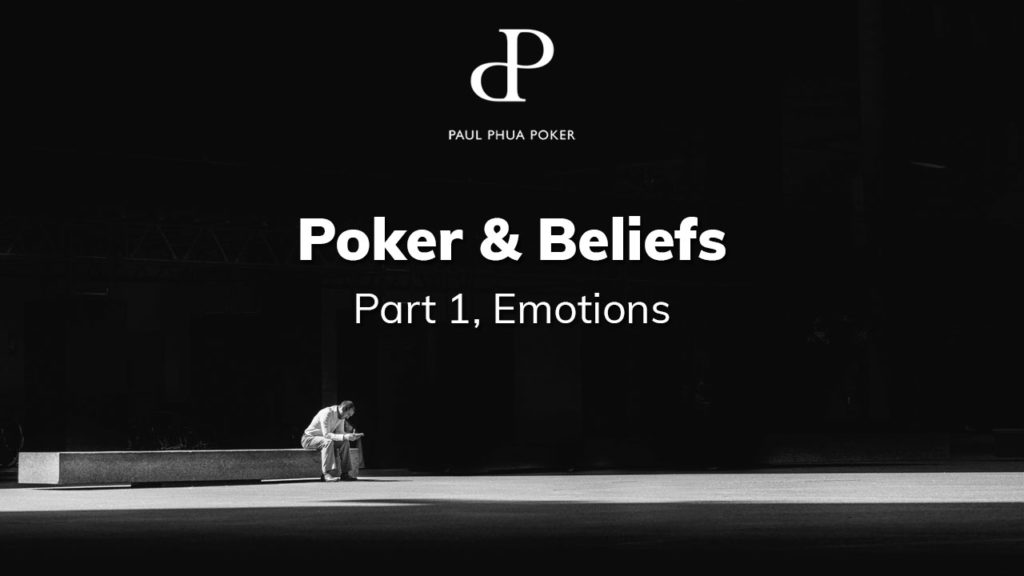
World-class poker players have developed the ability to focus their attention. But what does that mean? How does the focus of that attention away from the tables affect our decisions on it?
‘Attention’ is the focus of Part 2 of our look into how our belief systems work, and what that means to a professional poker player.
In any given moment, a dazzling array of stimuli bombards our senses with an incredible amount of data.
Imagine sitting at the poker table. You look down to see pocket aces under the gun. The player to your direct left has brought his pet dog to the game, and it’s trying to lick your arm. A waif of a waitress is asking everyone for a drinks order in her mini-skirt. A man with purple hair takes the unoccupied pew and slams a bag of mint humbugs on the table. And the clock still ticks.
Meanwhile, you’re trying to switch from your high-beta brainwave state to alpha, soaking up feedback from your environment, and the beliefs that live inside your subconscious.
The Triton Poker Ambassador, Jason Koon, explained his thought process during a post on the partypoker blog.
- What range of hands do I continue here?
- What is my opponent(s) range(s)?
- How does this board interact with all of the ranges?
- Who is the board best for?
- Who has the most significant proportion of big hands here?
- What is my mix ( Game Theory Optimal play involves the implementation of mixed strategies. i.e., sometimes you 3-bet this hand, and other times you call it. Occasionally you check and call a bet with this hand, but sometimes you check-raise it).
- What are stack sizes?
- What is the size of the pot?
- What is the stack-to-pot ratio?
- What is my betting strategy here?
- How many bet sizes do I need to play optimally?
- “I’m going to play two sizes, betting 30% pot and 90% pot.”
- What preferences does my hand have, is it more aggressive than my global range average or more passive?
- “Ok, my Jack of diamonds makes me play more aggressive, so I’m going to be 20% more aggressive than the global average. I think my hand favors the big size here but sometimes will fall into the small size. I’m going to check it 20% of the time bet it for 30% pot 30% of the time and bet the big size 50% of the time.”
- I now shuffle my chips and look down at my randomiser ( a pre-selected marker on the chip).
- “My marker on the chip is at 9’oclock, which is 75%, that falls within the frequency of me using my 90% pot bet-size, so that’s the option I choose.”
- What is my opponent’s strategy facing my bet here?
- How do they look physically?
- Who is my opponent, what history and reads do I have on them?
- What level do I think they are operating on, and what exploits do I need to consider?
Where we focus our attention is a fundamental component in creating the beliefs that ultimately decide our experience.
Once we understand that our attention is a superpower, we can learn to control it, enabling us to change or eliminate disempowering and/or false beliefs.
As you can see from Koon’s thought-process (not including external stimuli), it’s not easy for a poker player to focus their attention on the right things.
Selective Attention
To prevent the likes of Koon from feeling overwhelmed each hand, he has to filter out an enormous amount of internal and external prompts because despite perceiving the world through our sensory structures it’s our attention that decides the controlling experience.
A top poker player could suffer from sciatica, and not feel a single tingle when in a flow state during a game. Poker players can play for long periods with no sense of time.
A toddler could be suffering an excruciating toothache, but stick them in front of ‘Little Baby Bum’ for 90-minutes, and suddenly the aches and pains feel more manageable.
Additionally to external stimuli, the mind doesn’t shut up. Selective attention, both good and bad, also exists in our internal world. Phil Galfond recently stopped his heads-up challenge against VeniVidi1993 because he had lost the ability to suppress unhelpful thoughts and feelings. Previous to this decision, Galfond admitted feeling good despite his losses, showing that false beliefs don’t cease to exist once you pay attention to them; you merely drop them from your conscious awareness, moment by moment.
Perceptions and Beliefs
When we pay attention to something, such as the way someone is acting at the poker table, we’re creating perceptions that are reinforced by beliefs handed to us as children. These beliefs dictate our reality. If we’re unaware of this process, then the snake starts eating its arse.
Our mentors and cultures hand us a set of beliefs.
We perceive experiences based on these beliefs.
The perception strengthens the boundary of these beliefs.
Beliefs act as rules that allow us to automate future behaviour. Paramount, when you consider how many pieces of information via sight, sound, sensation, smell and taste hit you every second.
Go back to Jason Koon’s thought process during a hand.
At times, during a high roller tournament, he has 20-seconds to act. It takes 20-seconds to read his list of thoughts! Koon does this in a few seconds because he has paid attention to these rules, and implemented a disciplined habit that needs very little conscious thought.
If Koon’s thought process is wrong and becomes an automated, habitual response, then he’s going to be in a world of hurt. The same applies off the table.
Automation saves time, but if you get these mental maps wrong, then you are opening up yourself up to a gallstone world of hurt, through unpleasant emotions.
“Beliefs form when we put our attention on a certain interpretation of an event and agree it’s true.” – Gary Van Warmerdam, author of MindWorks: A Practical Guide for Changing Thoughts, Beliefs and Emotional Reactions
The Habit of Attention
We make moves on the chessboard of life that either increase our status, maintains the status quo, or in some unhealthy situations, decreases our status.
Life is a status game.
When we’re children, we obey the natural order of status hierarchy. Meaning, when adults tell us to do something, we follow. We create a belief that we must give authority figures our attention.
Attention is a two-way mirror. While we are giving adults our attention, we’re also sucking up their perceived view of us, hardening beliefs that will cause us a lot of future pain.
You are incapable.
You are too small.
You are beautiful
As children, we don’t understand the consequences that accompany blindly accepting these beliefs as real. Then as we age, this act of giving our attention to authority figures continues.
Media.
Politicians.
Celebrities.
Admirable poker players.
Thanks to the work of the psychologist, Carol Dweck, author of Mindset: The New Psychology of Success, we know that people either have a dominant ‘Fixed’ or ‘Growth’ mindset.
When we develop the ingrained habit of giving our attention to authority figures, we start to fear what other people think of us and begin seeking external approval. It’s a fixed mindset behaviour that even the most talented people can acquire (Dweck discusses John McEnroe’s fixed mindset in her book).
We need to find a way to control the focus of our attention, so we can form beliefs that are independent of the pressures of societal conditioning.
Conditioning by Rules
The rules that people force upon us consist of a series of shoulds, should-not, supposed to, supposed not to. If we try to change these beliefs without a thought out strategy, we feel guilt, uncomfortableness, and even shame.
We haven’t always taken these rules lying down.
As toddlers, we rebelled, but the weight of adult pressure wore us down. We tried again as teenagers, but faced with the dilemma of the less painful choice of ‘fitting-in’ versus the suffering stricken process of trying to find true belonging, we tapped-out once again.
During my many interviews, I have learned that a high volume of professional poker players rebelled as teenagers and refused to tap-out, finding a newer, more exciting path of least resistance called the poker world.
For the rest of us, now, we’re adults, we can try again.
Before we do, a word of warning for the rebel. Rebels can often become fixated on passing the problem to other people, thus keeping their false beliefs safe from scrutiny.
Also, when applying attention to false beliefs, you’re only able to perceive aspects of yourself that confirm those false beliefs. In turn, awareness of your true capabilities, and your authentic desires, wants, and needs become obscured.
Your attention under the control of these false beliefs only allows you to perceive aspects of yourself that confirm your beliefs. Awareness of authentic nature; loves, and goals are shrouded in darkness, way back in the untouched parts of your mind.
When people say things like, “I have low self-esteem,” or “I procrastinate,” or people call them ‘”lazy” – they often have a perception problem.
How to Gain Control of Attention
You need to be self-aware.
Mindfulness and meditation help, but it’s not a panacea. You can be zen one moment, and then become batshit crazy the next, if your partner ignites an old false-belief system.
So be aware of what you say, and how you react in a situational sense. One excellent way to do this is to journal regularly. I help people recover from alcohol addiction, and most of our work around dissolving false beliefs that trigger our desire to drink comes from introspection. We break down our thought-process until we get to a root cause belief that’s pulling all of the strings, and then we run that core belief through the lens of scepticism.
Pay particular attention to fear-based beliefs and rules. Back to Galfond’s match against VeniVidi1993, and his post-session breakdown of thought-process on Twitter, you can see how fear-based beliefs, developed from childhood, are dictating his decision. Fortunately, through Galfond’s awareness, he’s able to notice this and step away from the game to reevaluate.
When journalling, it always pays to look at the incident in question as an observer, writing from the third-person perspective. Each of us is schizophrenic by natures with various character archetypes making up our personality. Each of our fear-based beliefs learned through childhood, belongs to an archetype. If we can stop communicating these beliefs through the voice of the archetype; instead choosing the observer status, then you lessen the emotional response.
Example: my wife, mother-in-law, and I recently became embroiled in a threeway argument over the health of my daughter, who was sick at the time. My wife’s perception, linked to a belief system, was that her mother and I were ganging up on her, and making her feel like a bad mother through our joined-up critique.
I helped her change her attention from her Victim, Child, and Judge archetypes to Observer status, and she realised that we were all concerned about the health of my daughter, and those behaviours came from a place of love.
By diffusing all of that negative energy, we disempowered a false belief and recovered personal power. By finding a grain of truth, from the observer perspective, light replaced dark.
For my wife to switch as she did, she needed to have an open, sceptical mind. She went from blindly accepting a belief as real, to changing her attention, and then seeing the bias in it.
The more personal power you can pull back from these draining emotional experiences based on false-beliefs, the stronger you become at shining a light on them. Your newly restored reserves of personal power then break down even more beliefs, in a positive cycle of improvement.
The inspiration behind this series comes from the book Mindworks: A Practical Guide for Changing Thoughts, Beliefs and Emotional Reactions by Gary van Warmerdam.
https://pathwaytohappiness.com/about/gary-van-warmerdam/





